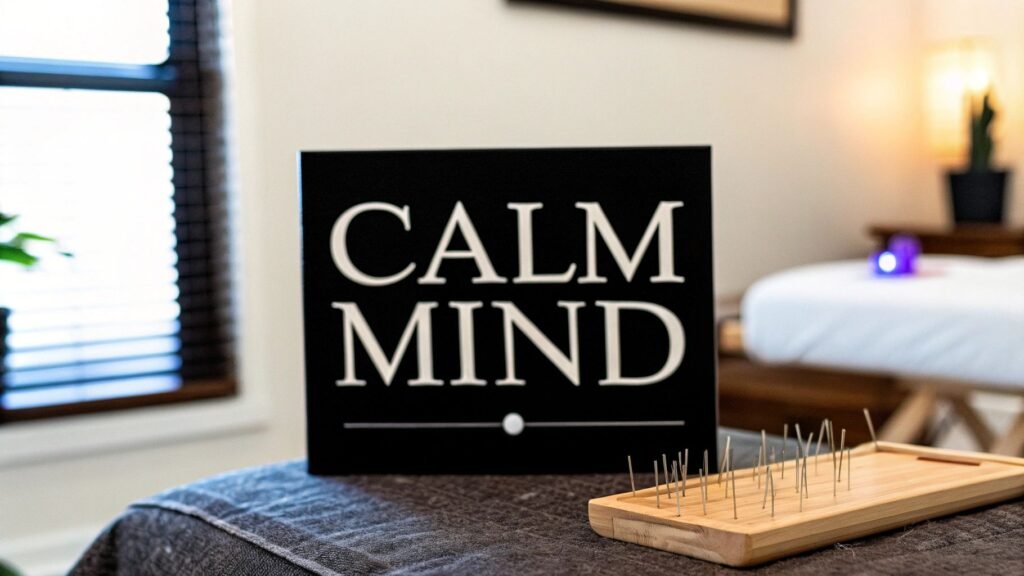At its core, acupuncture helps relieve anxiety by bringing a deep sense of calm to your body's central nervous system. By stimulating very specific points, it helps regulate the stress hormone cortisol, encourages the release of natural mood-boosters known as endorphins, and gently shifts your body out of a constant 'fight-or-flight' state into a more relaxed 'rest-and-digest' mode.
Understanding The Pathways To Calm
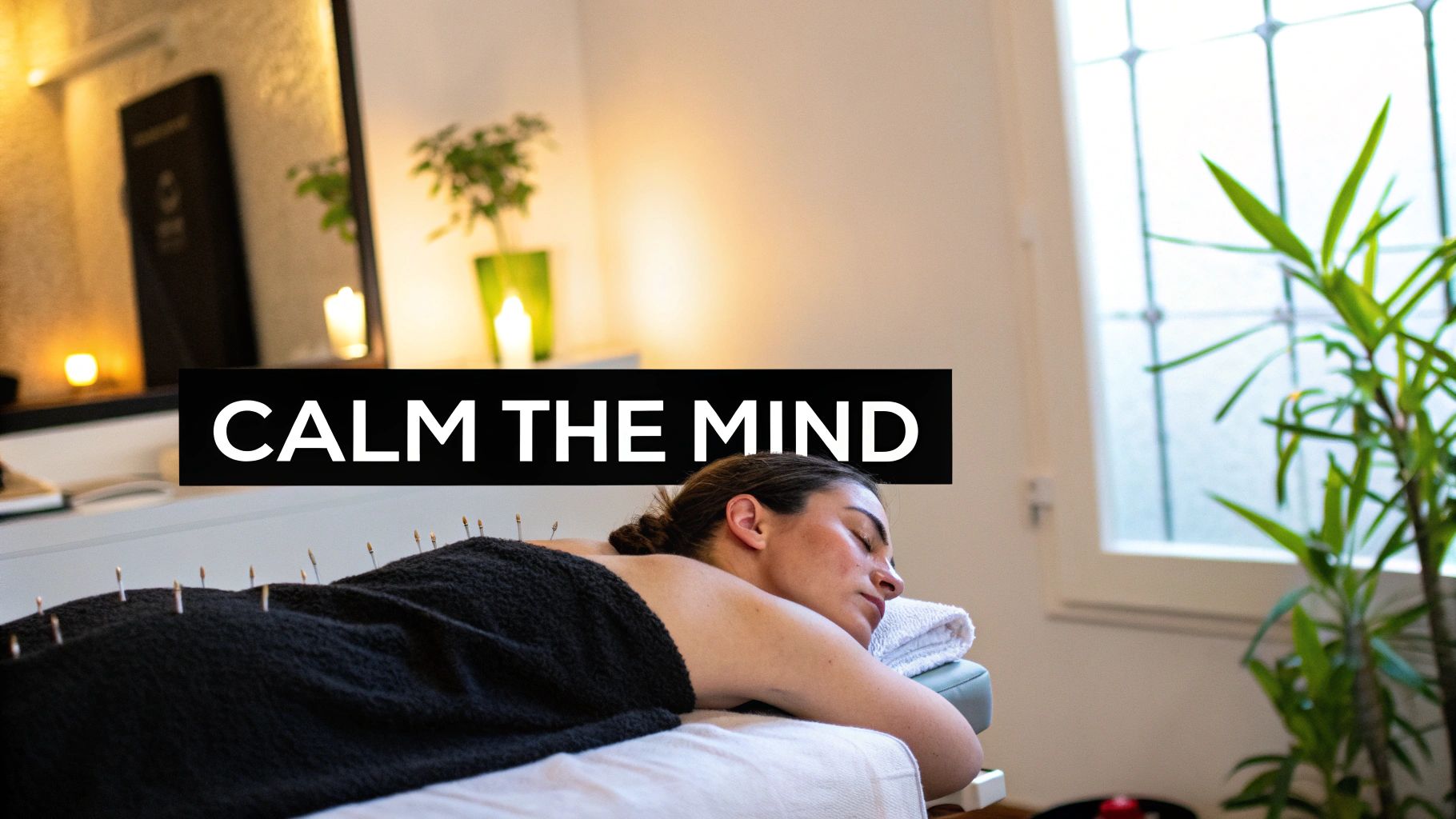
When you're dealing with anxiety, your body is essentially stuck on high alert. This constant state of readiness is driven by the sympathetic nervous system—the one in charge of our "fight-or-flight" response.
Acupuncture acts as the perfect counterbalance. It activates the parasympathetic nervous system, which is what allows our bodies to rest, recover, and heal. Think of it like gently pressing the brakes on a racing car; it gives the engine a chance to cool down and start running smoothly again.
This calming effect is a powerful way to manage not just the mental chatter of anxiety but also the very real physical symptoms that come with it, like a racing heart, digestive upset, or tense muscles. By addressing the physiological roots of anxiety, acupuncture offers a foundational approach to restoring your natural state of balance.
For a deeper dive into how we tailor treatments for this, you can explore our guide on acupuncture for stress management.
The Key Mechanisms At Work
To really appreciate how acupuncture helps with anxiety, it helps to look at the specific ways it interacts with your body. Each mechanism contributes to a broader sense of well-being, creating a comprehensive effect that goes far beyond just masking symptoms. The goal is always to target the root imbalances that fuel anxious feelings in the first place.
Acupuncture provides a tangible way to interrupt the cycle of anxiety. By signaling the brain to release calming neurochemicals and down-regulating the stress response, it helps your body remember what it feels like to be at ease.
Here’s a quick summary of the primary ways this ancient practice offers modern relief for an anxious mind.
How Acupuncture Works to Relieve Anxiety
| Mechanism | How It Works | Impact on Anxiety |
|---|---|---|
| Neurotransmitter Regulation | Stimulates the release of endorphins, serotonin, and dopamine—your body’s natural "feel-good" chemicals. | Elevates mood, promotes relaxation, and creates a sense of well-being. |
| HPA Axis Modulation | Down-regulates the Hypothalamic-Pituitary-Adrenal (HPA) axis, your body's central stress response system. | Lowers levels of the stress hormone cortisol, reducing feelings of being overwhelmed and "on edge." |
| Autonomic Nervous System Balance | Activates the parasympathetic nervous system ("rest-and-digest") while calming the sympathetic nervous system ("fight-or-flight"). | Lowers heart rate, eases muscle tension, and helps the body shift out of a high-alert state. |
| Pain and Tension Relief | Releases natural painkillers (endorphins) and relaxes tense muscles often associated with chronic anxiety. | Reduces physical symptoms like headaches, neck pain, and stomach knots that can worsen anxiety. |
This framework gives you a clear overview of what's happening beneath the surface during a treatment. In the sections that follow, we'll explore the detailed science and traditional wisdom behind each of these components.
How Acupuncture Rewires Your Brain for Calmness
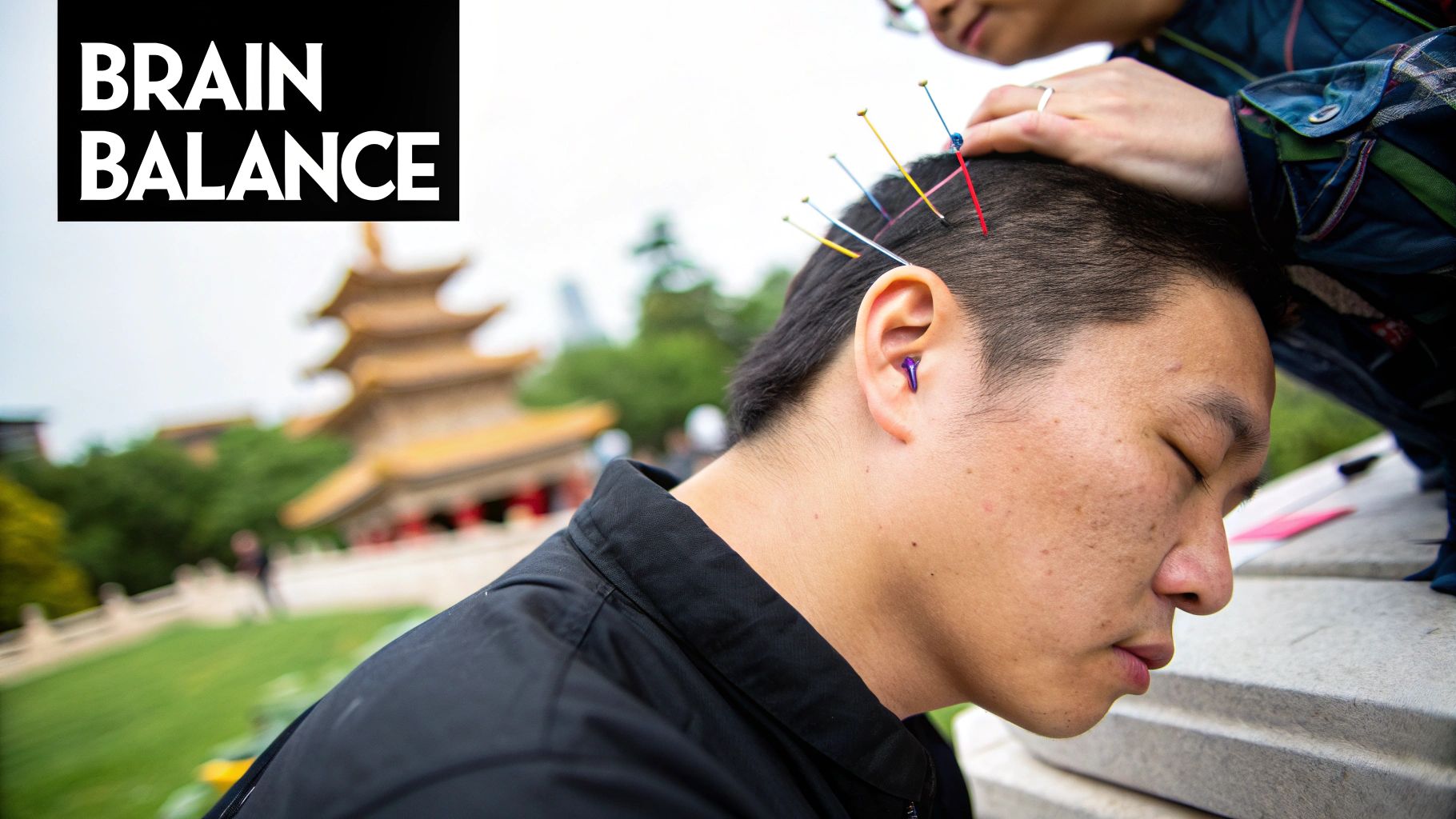
Think of your nervous system during a bout of anxiety as an electrical grid in a lightning storm—it's completely overloaded with chaotic energy. Acupuncture works like a master technician, using incredibly fine needles at precise points to gently redirect that energy and bring the system back into balance.
This isn't just about surface-level muscle relaxation. It’s about sending clear, direct signals to the command centers in your brain that manage everything from your stress response to your emotional state.
When an acupuncture needle is inserted at a specific point, it creates a subtle signal that travels up your nerve pathways straight to the brain. It's a precise form of communication, prompting your body to tap into its own powerful, built-in calming mechanisms. This is the neurological foundation of how acupuncture works for anxiety.
Calming Your Brain's Alarm Center
Deep inside your brain lies the amygdala, which you can think of as your internal smoke detector. Its job is to sound the alarm when it senses danger. But for those of us struggling with anxiety, that alarm can become hyper-sensitive, triggering the "fight-or-flight" response over and over, even when there's no real threat.
Acupuncture has a remarkable knack for turning down the volume on this faulty alarm.
Functional MRI (fMRI) studies have actually visualized this effect, showing that stimulating certain acupuncture points leads to decreased activity in the amygdala. This helps to quiet that constant, draining sense of hypervigilance that is so characteristic of an anxious mind.
By calming the amygdala, acupuncture helps your brain re-learn that it doesn't need to be in a constant state of emergency. This process rewires your neural pathways over time, building a greater resilience to stress.
This effect is so powerful because it gets to the very root of the physiological anxiety response. Instead of just temporarily masking symptoms, it helps to recalibrate the system that creates them, leading to a more lasting sense of peace and control.
Releasing Your Body’s Natural Calming Chemicals
Beyond just quieting the brain's alarm bell, acupuncture also stimulates a release of your body's own powerful chemical messengers, known as neurotransmitters. These are the molecules that govern your mood, your energy levels, and your overall sense of well-being. This carefully orchestrated chemical shift is a huge part of how acupuncture helps ease anxiety.
Here’s a look at the key players involved:
- Endorphins: Often called the body’s "natural painkillers," endorphins also create a wonderful feeling of calm and even euphoria. Acupuncture is famous for getting them flowing.
- Serotonin: This is a crucial neurotransmitter for stabilizing mood and promoting feelings of happiness. Many modern antidepressants work by increasing serotonin levels, and acupuncture can produce a similar effect, naturally.
- Dopamine: Known as the "reward" chemical, dopamine is tied to our feelings of pleasure and motivation. Bringing dopamine into balance helps combat the sense of apathy that so often comes with anxiety.
This biochemical cascade is why so many people report feeling profoundly relaxed and peaceful—sometimes even a bit blissful—during and after a session. It’s a complete physiological reset that moves your body out of a stressed-out state and into a state of deep recovery.
Managing long-term stress also means supporting the glands that work so hard to regulate it. You can learn more about this in our guide on how to support adrenal glands.
The Clinical Proof Behind Acupuncture for Anxiety
We've covered the "how" from both a modern neurological and a traditional perspective. But the big question for many people is, "Does science actually back this up?" The answer is a clear and compelling yes. There’s a solid and growing body of research showing that the anxiety relief people feel from acupuncture is real, measurable, and much more than just a placebo effect.
Scientific studies are consistently finding that acupuncture creates tangible, physiological changes that calm an anxious mind. We're not just talking about patients saying they feel better. Researchers use objective, validated tools like the Hamilton Anxiety Rating Scale (HAM-A) to quantify the improvements. This lets them compare acupuncture head-to-head against other treatments, including conventional medications and even sham acupuncture (where needles are placed in random, non-therapeutic spots).
This kind of rigorous testing is exactly what's needed to separate the specific effects of true acupuncture from everything else, giving us solid evidence that it really works.
Sustained and Significant Results
What I find most exciting in the recent research is the lasting impact of acupuncture. Some treatments might give you a temporary sense of calm, but study after study shows that a proper course of acupuncture can lead to sustained relief from anxiety, long after the sessions are over. It’s as if the treatments help the body and brain learn a new, less anxious way of being.
A fantastic 2022 clinical trial really drove this point home. The study looked at patients with Parkinson's disease who were also dealing with significant anxiety. Right after the treatment course, both the real acupuncture and sham (placebo) groups saw similar improvements—over 60% of people in both groups felt better. But the real story unfolded two months later. An incredible 86.8% of the patients who received real acupuncture had either maintained or improved their results. In the sham group? Only 6.4% did.
This points to a powerful, long-term therapeutic effect that’s hard to ignore. You can read the full research about these anxiety findings for yourself.
This type of evidence is so important because it shows that acupuncture isn't just about a momentary feeling of relaxation. It seems to be helping the body genuinely recalibrate its entire stress-response system for the long haul.
This durable impact is a huge reason why so many people now see acupuncture as a foundational part of their mental wellness plan, whether on its own or alongside other therapies.
Comparing Acupuncture to Standard Care
So, how does acupuncture actually measure up against the treatments your doctor might typically recommend? This is where the research gets really practical. A number of studies have put acupuncture in a direct comparison with standard care, like antidepressants or psychotherapy.
The results are consistently positive. Many large-scale analyses have concluded that acupuncture is not just an effective option, but it also carries a much lower risk of side effects than many common medications.
Here are a few key takeaways from those comparative studies:
- Efficacy: For generalized anxiety disorder (GAD), acupuncture often performs just as well as—and in some cases, even better than—certain medications.
- Safety: When performed by a licensed practitioner, acupuncture has an exceptionally low risk of adverse effects. This makes it a safe choice for a wide range of people.
- Complementary Power: It integrates beautifully with other treatments. Acupuncture can often boost the benefits of talk therapy or help patients manage the unwanted side effects of their medication.
All this clinical evidence helps cement acupuncture’s place as a credible, effective, and powerful tool in the modern mental health toolkit.
The Traditional Wisdom on Balancing Emotional Health
While modern science drills down into brain chemistry and nervous system responses, Traditional Chinese Medicine (TCM) offers a much broader, holistic view of how acupuncture can help with anxiety. For thousands of years, this system has viewed the body as a complete ecosystem where emotional well-being and physical health are inseparable. This ancient perspective provides a powerful framework for getting to the root of what’s causing the anxiety in the first place.
At the very heart of TCM is the concept of Qi (pronounced "chee"). Think of it as the vital life force or energy that animates your entire body. This energy is meant to flow smoothly through specific pathways, almost like a network of rivers, known as meridians. When your Qi is full and flowing freely, you feel balanced, healthy, and emotionally steady.
From this perspective, anxiety is basically a major traffic jam in this energy flow. Instead of moving smoothly, the Qi gets stuck, agitated, or even drained, which then creates the mental and physical symptoms we all recognize as anxiety.
Connecting Emotions and Organ Systems
In TCM, emotions aren't just abstract feelings floating around in your head; they're seen as physiological events tied directly to specific organ systems. Each major organ is tasked with managing a particular emotion and ensuring it’s expressed in a healthy way. This is a foundational concept for understanding what is Traditional Chinese Medicine and its unique approach to mental wellness.
"In Traditional Chinese Medicine, the mind and body are not separate. An emotional imbalance is also a physical imbalance, and by treating the body’s energy systems, we can restore emotional harmony."
When it comes to anxiety, a few key organ systems nearly always play a role:
-
The Heart: In TCM, the Heart is said to "house the Shen," which you can think of as your spirit or consciousness. A balanced Heart system gives you a calm mind and peaceful sleep. But when the Heart's energy is disturbed, it can lead to palpitations, restlessness, and insomnia—all classic signs of anxiety.
-
The Liver: The Liver's job is to ensure the smooth, even flow of Qi throughout your entire body. When stress or frustration gets the best of you, it can cause the Liver Qi to stagnate. This creates that feeling of irritability, tension, and being emotionally "stuck" that so often goes hand-in-hand with anxiety.
-
The Spleen: The Spleen governs our thinking, focus, and intellect. So, if you're prone to overthinking, constant worry, or obsessive thoughts, it can weaken the Spleen's function. This can lead to fatigue, digestive troubles, and a specific kind of anxiety that feels rooted in pure mental exhaustion.
Treating the Root Cause, Not Just the Symptoms
A skilled acupuncturist doesn't just see "anxiety"; they diagnose the specific pattern of imbalance that is unique to you. It’s a highly personalized process.
For instance, one person’s anxiety might stem from "Liver Qi Stagnation," showing up as irritability and tightness in their chest. Another person might be dealing with "Heart Yin Deficiency," which could cause symptoms like night sweats and a racing heart.
By identifying that core pattern, the practitioner can select precise acupuncture points to clear the energy blockages, nourish the depleted organ systems, and get the Qi flowing smoothly again. This is how acupuncture for anxiety works to resolve the underlying disharmony, aiming for profound and lasting relief instead of just putting a temporary band-aid on the symptoms.
What to Expect During Your First Acupuncture Session
Walking into your first acupuncture appointment can feel a bit mysterious, but knowing what’s in store can help you relax and get the most out of the experience. The entire process is designed to be calming and centered around you. It’s a quiet, restorative time dedicated to your well-being.
Your session will start with a conversation. This isn't just a quick "what's wrong?" chat; your practitioner wants to get the full picture of your health. We'll talk about your anxiety, sure, but also your sleep, your digestion, your energy levels, and your lifestyle. This holistic approach is key, as it helps us pinpoint the specific imbalances that are contributing to how you feel.
The Treatment Process
After we've talked, you'll get comfortable on a treatment table in a quiet, peaceful room. The acupuncturist will then gently insert the needles. It's a common concern, but these needles are not what you might imagine—they are sterile, used only once, and are often as thin as a single strand of hair.
Most people are genuinely surprised at how little they feel. You might sense a tiny prick as the needle goes in, which quickly fades into a subtle feeling of warmth, tingling, or a gentle, dull pressure at the point. We call this sensation "deqi," and it’s a good sign. It tells us that your body's energy, or Qi, is responding to the treatment.
This infographic breaks down what a typical first session looks like.
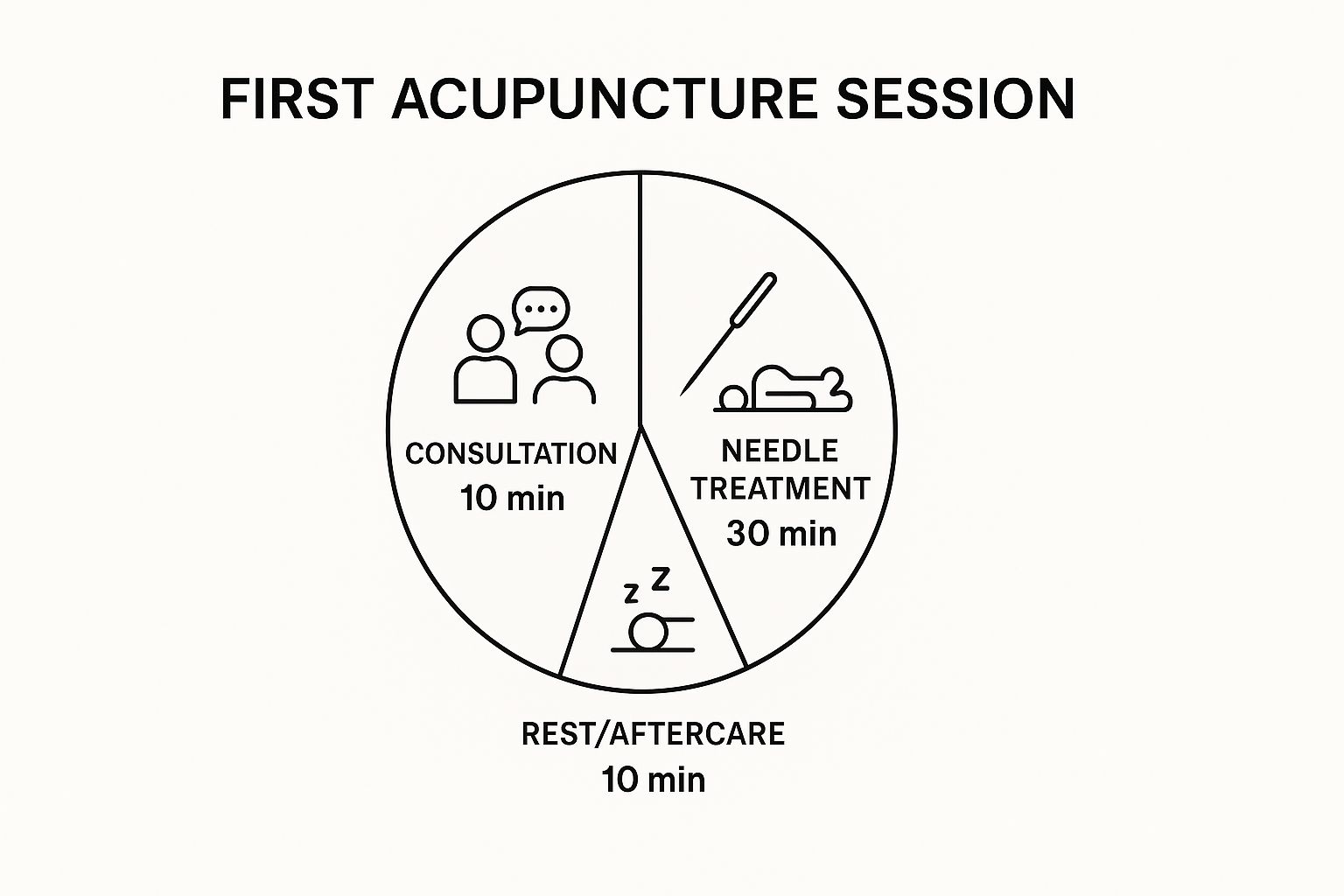
As you can see, the bulk of your time is spent resting with the needles in. This is where the real therapeutic magic happens.
The Relaxation Phase
Once all the needles are placed, the lights are often dimmed, and you’re left to rest for about 20-30 minutes. This is your time to simply be. Many people find themselves drifting into a deeply relaxed, almost meditative state; some even fall asleep. That's a fantastic sign that your nervous system is shifting from "fight-or-flight" into its calmer "rest-and-digest" mode.
After this quiet period, the needles are gently removed, and you’ll have a few moments to ease back into the day. If you're looking to learn more about different options, it can be helpful to explore local Acupuncture services to see what they offer. Most people walk out of their first session feeling a profound sense of calm and clarity.
Acupuncture Compared to Conventional Anxiety Treatments
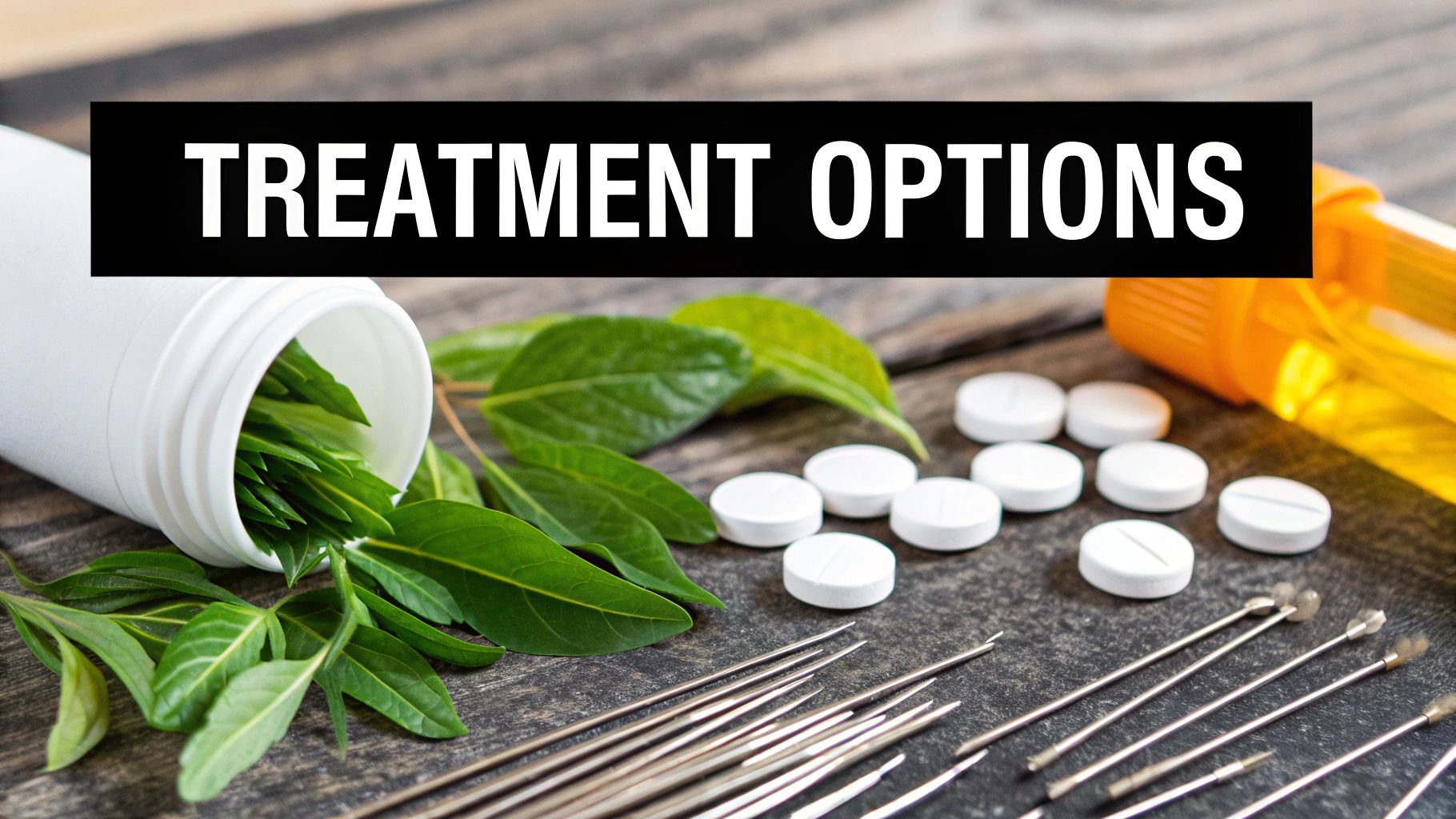
So, knowing how acupuncture can help with anxiety brings up a really important question: how does it stack up against conventional treatments like medication or therapy? The point isn't to pit one against the other. Instead, let's look at how they can fit together to create a more comprehensive and personalized approach to your mental well-being.
For some, acupuncture is the first line of defense against milder anxiety. They’re often drawn to its ability to gently guide the body back to its natural state of balance, all with minimal side effects. For others, it’s a powerful ally that works alongside their existing treatments, helping to boost the progress made in psychotherapy or even manage the side effects from necessary medications. This flexibility is truly one of its greatest assets.
Comparing Your Options
When you lay out the different treatments for anxiety side-by-side, it becomes clear that each has its own set of strengths. Medications like SSRIs, for example, can be incredibly effective but often take several weeks to kick in and can bring a host of potential side effects. On the other hand, psychotherapy, like Cognitive Behavioral Therapy (CBT), gives you indispensable tools for managing your thoughts, but it requires commitment and active effort.
Acupuncture takes a different route, working directly on the body's physiological response to stress. And the research backs this up. A major meta-analysis covering 1,782 patients found that acupuncture didn't just ease anxiety symptoms—it did so with fewer side effects than common medications like Paroxetine. The study underscored acupuncture's excellent safety and effectiveness, marking it as a solid alternative. You can discover more insights from this large-scale analysis to see the data for yourself.
To help you get a clearer picture of your options, here’s a straightforward comparison of the main approaches to anxiety care.
Acupuncture vs. Conventional Anxiety Treatments
This table provides a comparative overview, helping you understand where each approach shines in the journey toward managing anxiety.
| Feature | Acupuncture | Medication (SSRIs) | Psychotherapy (CBT) |
|---|---|---|---|
| Primary Goal | Restore energetic balance and calm the nervous system. | Alter brain chemistry to regulate mood. | Change negative thought patterns and behaviors. |
| Time to Effect | Often immediate calm, with cumulative long-term benefits. | Typically 4-6 weeks for full therapeutic effect. | Gradual improvement with consistent practice. |
| Side Effects | Very rare; may include minor bruising or fatigue. | Common; may include nausea, fatigue, weight changes. | None, but can be emotionally challenging initially. |
| Best For | Complementary care, holistic wellness, reducing physical anxiety symptoms. | Moderate to severe anxiety, chemical imbalances. | Learning long-term coping skills, addressing root thoughts. |
Ultimately, there is no single "best" treatment—only the best treatment for you. Understanding how each works allows you to make an informed decision and build a support system that addresses your mind, body, and spirit.
Your Questions About Acupuncture for Anxiety, Answered
It’s completely normal to have questions when you’re thinking about a new approach to your health. Let's walk through some of the most common things people ask about using acupuncture to manage anxiety, so you can feel clear and confident about what to expect.
Does Acupuncture Hurt?
This is probably the number one question on everyone's mind. The short answer? Not really.
Acupuncture needles are incredibly thin—about the width of a human hair. Most people describe the initial sensation as a tiny, fleeting pinch. After that, you might feel a dull ache, a gentle warmth, or a slight tingling feeling around the needle. This sensation is actually a good sign, known in Traditional Chinese Medicine as "deqi", which indicates the treatment is starting to engage your body’s energy.
How Many Sessions Will I Need?
There's no one-size-fits-all answer, as everyone’s body and experience with anxiety are different. While some people report feeling calmer even after their first appointment, the real, lasting benefits come from consistency.
Think of it like building a new healthy habit. Your practitioner will work with you to create a plan, which often involves weekly sessions to start. As your symptoms begin to improve and stabilize, those visits will likely become less frequent.
Researchers are constantly exploring ways to enhance these outcomes. For example, a modern technique called electroacupuncture (EA) is showing promise for people who struggle with anxiety-related insomnia. One clinical trial is currently following patients for eight weeks to see how EA improves both their sleep quality and anxiety levels. This highlights how a dedicated treatment plan can tackle the interconnected symptoms of anxiety. You can see the latest research on EA for anxiety to understand more.
At Eric Tsai Acupuncture and Herbs, we create a plan that’s built entirely around you and your goals for finding relief. To see how we can help you on your path to wellness, visit us at https://drerictsai.com.

